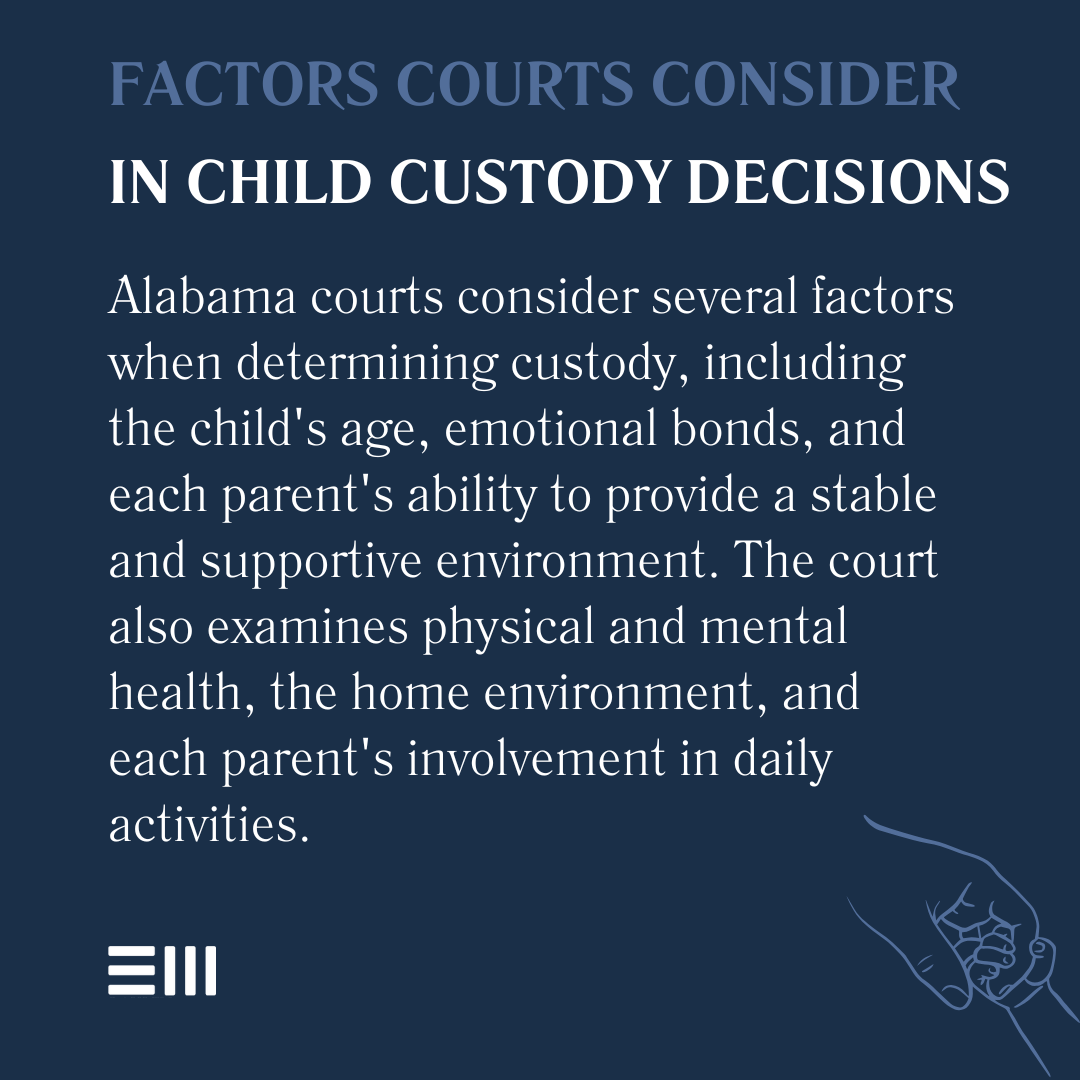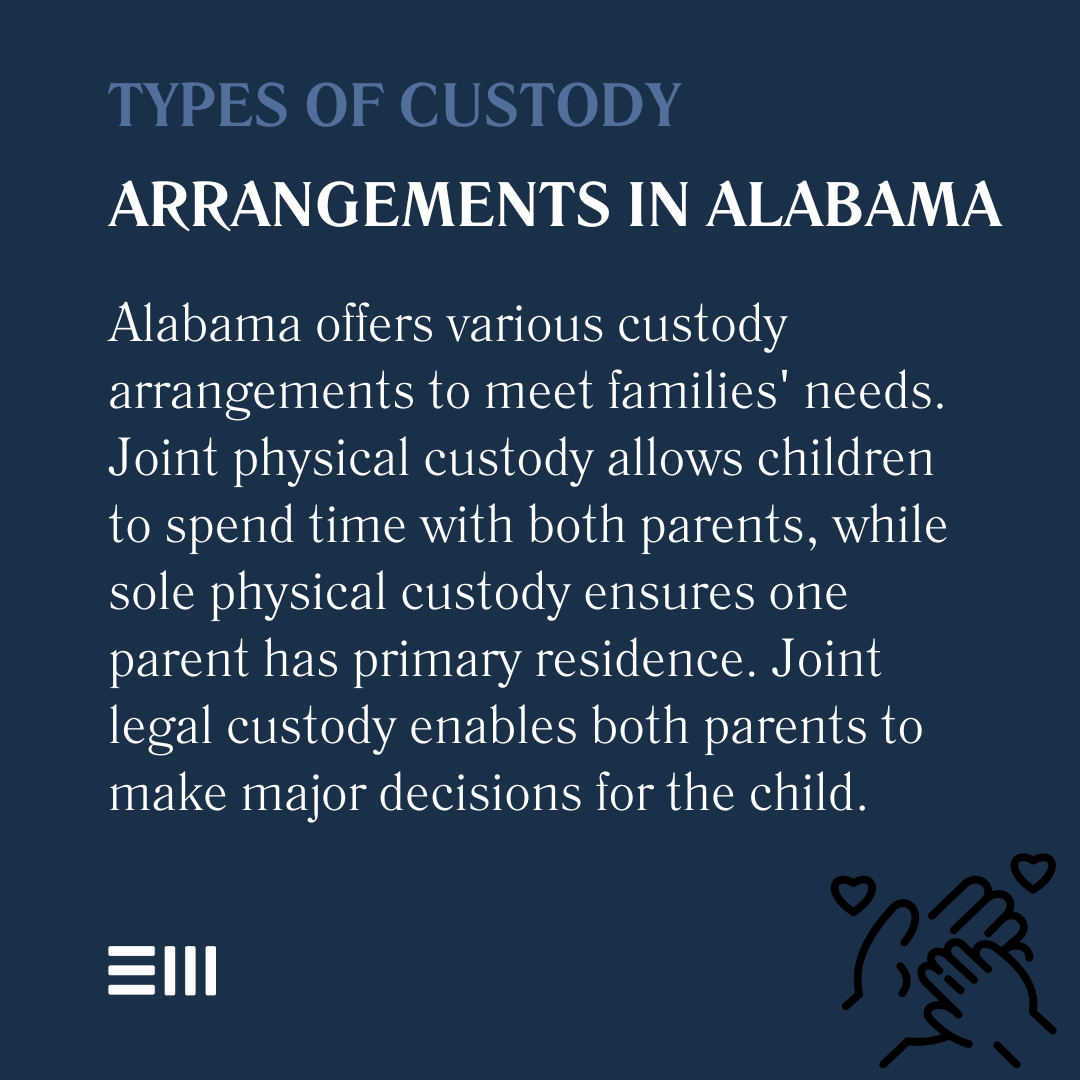Behind every child custody decision lies a story of family transformation. Parents across Alabama face the complex challenge of reshaping their children's lives while protecting their bonds with both mother and father.
From Birmingham's busy suburbs to Mobile's coastal communities, families navigate these changes while striving to create stable, nurturing environments for their children.
The path forward requires understanding Alabama's unique approach to custody arrangements and knowing how to advocate effectively for your children's future.
Understanding Alabama Custody Laws
Alabama's custody laws prioritize the best interests of the child while recognizing the rights of both parents.
The state's approach to custody has evolved significantly over recent years, establishing new precedents that shape current cases.
- Alabama courts now strongly favor joint custody arrangements when both parents demonstrate capability and willingness to cooperate in child-rearing.
- The state recognizes both legal custody (decision-making authority) and physical custody (where the child lives), which can be awarded jointly or solely.
- Alabama law requires courts to consider domestic violence history, with specific provisions protecting children from potentially harmful situations.
- Parents must submit a detailed parenting plan outlining schedules, responsibilities, and decision-making processes before custody determinations.
- The court considers each parent's ability to foster a positive relationship between the child and the other parent when making custody decisions.
Understanding these fundamental aspects of Alabama custody law helps parents prepare effectively for custody proceedings and make informed decisions throughout the process.
Factors Courts Consider
Alabama courts evaluate numerous factors when determining custody arrangements.
Understanding these factors helps parents present their cases effectively and make decisions that support their children's best interests.
- The child's age, health, and emotional ties with each parent play a crucial role in custody decisions.
- Each parent's physical and mental health status affects their perceived ability to care for the child.
- The stability of each parent's home environment, including proximity to schools, family support systems, and extracurricular activities.
- Each parent's employment situation, including work schedules and ability to provide for the child's needs.
- The child's established routines and the potential impact of changes to these routines.
- Evidence of each parent's involvement in the child's education, healthcare, and daily activities.
These factors help courts make comprehensive evaluations of each family's unique situation and determine appropriate custody arrangements.
Types of Custody Arrangements
Alabama recognizes several custody arrangements that can be tailored to meet each family's specific needs.
Understanding these options helps parents advocate for arrangements that serve their children's best interests.
- Joint physical custody allows children to spend substantial time with both parents, often with a relatively equal division of parenting time.
- Sole physical custody with visitation rights grants one parent primary physical custody while ensuring the other parent maintains regular contact with the child.
- Joint legal custody enables both parents to participate in major decisions about education, healthcare, and other important aspects of the child's life.
- Bird's nest custody, though less common, allows children to remain in one home while parents alternate residing there, minimizing disruption to children's routines.
These various arrangements can be combined and modified to create custody solutions that work for each family's unique circumstances.
The Custody Determination Process
The path to establishing custody in Alabama follows specific legal procedures designed to protect children's interests while ensuring fair consideration of both parents' rights.
- Initial filing requires submitting a custody petition and proposed parenting plan to the appropriate county court.
- Mandatory mediation sessions encourage parents to reach agreements without court intervention, saving time and reducing conflict.
- Guardian ad litem appointments may occur to represent the child's interests independently of either parent.
- Court evaluations might include home studies, psychological assessments, or interviews with the children, depending on case specifics.
- Final hearings present evidence and testimony before a judge if parents cannot reach an agreement through mediation.
Understanding this process helps parents prepare effectively and maintain realistic expectations throughout custody proceedings.
Frequently Asked Questions About Alabama Child Custody
Parents facing custody disputes often share common concerns about their rights and responsibilities under Alabama law.
Here are answers to the most pressing questions we encounter.
How Does Alabama Define the Best Interests of the Child?
Courts evaluate factors including stability, emotional bonds, educational opportunities, and each parent's ability to meet the child's physical and emotional needs.
Can Children Choose Which Parent to Live With?
Alabama courts consider children's preferences once they demonstrate sufficient maturity, typically around age 12, but this preference isn't the sole determining factor.
How Do Courts Handle Relocation Cases?
Parents must provide written notice 45 days before any planned move exceeding 60 miles, allowing the other parent to contest the relocation if desired.
The relocating parent must demonstrate the move serves the child's best interests, including considerations of educational opportunities, family support, and maintaining relationships with both parents.
What Happens if a Parent Violates a Custody Order?
Violations can result in contempt charges, fines, makeup parenting time, or custody modifications. Courts take order violations seriously and may require attendance at parenting classes or counseling.
Repeated violations could lead to modifications in custody arrangements, particularly if they demonstrate a pattern of interfering with the other parent's relationship with the child.
How Often Can Custody Orders Be Modified?
Orders can be modified when substantial changes in circumstances affect the child's best interests, such as relocation, remarriage, or significant changes in parent circumstances.
Secure Your Child's Future Today
Your children deserve a custody arrangement that promotes their well-being and maintains strong relationships with both parents.
Our experienced family law attorneys understand Alabama custody laws and have successfully guided hundreds of parents through the custody determination process.
With decades of combined experience in Alabama family courts, we focus on achieving outcomes that serve your children's best interests while protecting your parental rights.
Schedule a confidential consultation to discuss your custody situation and explore the best path forward for your family. Our team stands ready to protect your rights and advocate for your children's best interests.


